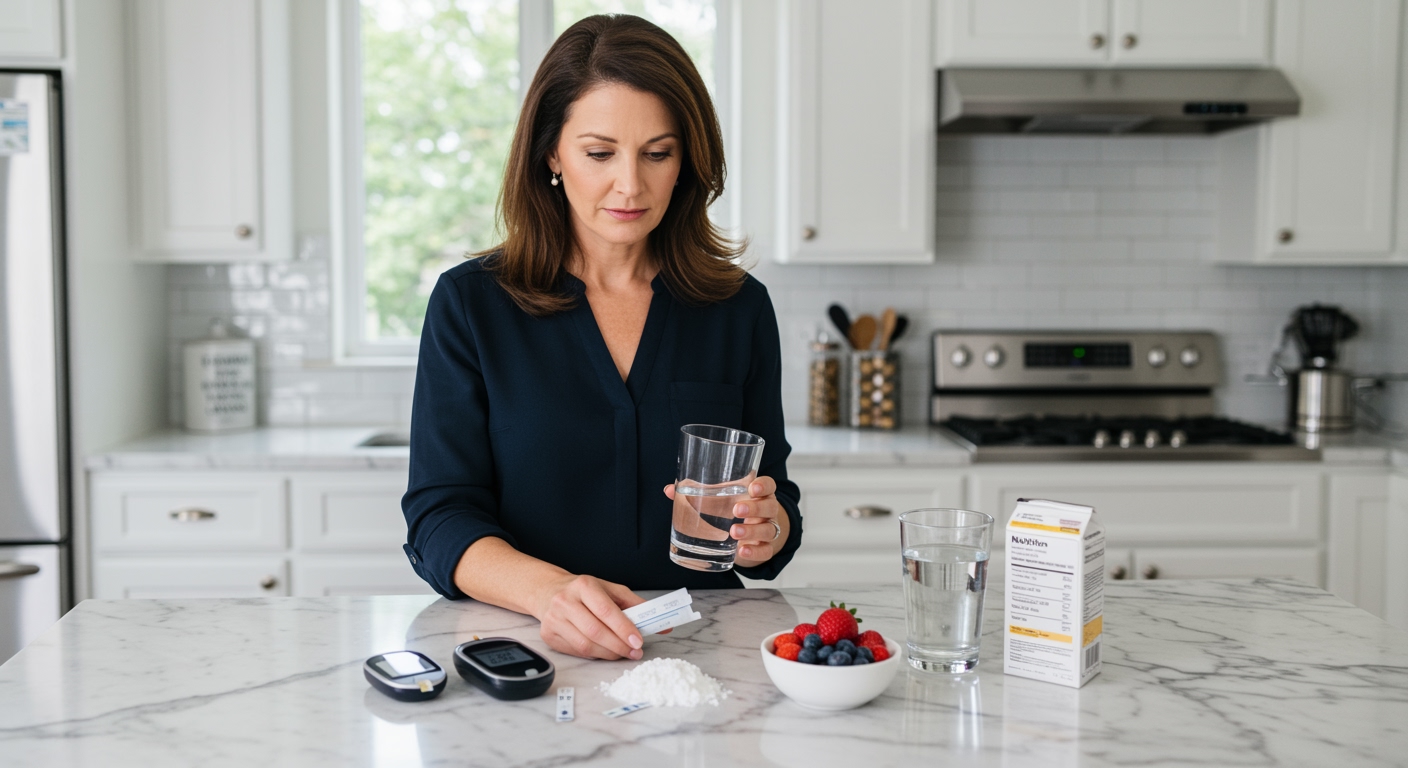✪ Key Takeaway: Sucralose appears safe for most people with diabetes but may affect insulin sensitivity in some individuals.
Introduction
You reach for that diet soda or sugar-free dessert thinking you made the smart choice for your blood sugar.
But recent research suggests the relationship between artificial sweeteners and diabetes might be more complex than we once believed.
Hi, I’m Abdur, your nutrition coach and today I’m going to explain whether sucralose is truly safe for people managing diabetes and what the latest science reveals about this popular artificial sweetener.
What Exactly Is Sucralose?
Sucralose is an artificial sweetener that tastes about 600 times sweeter than regular sugar.
Scientists create it by replacing three hydrogen-oxygen groups in sugar molecules with chlorine atoms.
This chemical change makes sucralose incredibly sweet while preventing your body from breaking it down for energy.
Your digestive system absorbs only about 15% of the sucralose you consume.
The remaining 85% passes through your body unchanged and gets eliminated through urine within 24 to 36 hours.
This unique structure explains why sucralose contains virtually zero calories and traditionally was considered safe for people with diabetes.
✪ Fact: Sucralose was discovered accidentally in 1976 when a researcher misheard instructions to test a compound and tasted it instead.
Does Sucralose Raise Blood Sugar Levels?
Most studies show that sucralose does not directly raise blood glucose levels in healthy people or those with diabetes.
A 2013 study published in Diabetes Care found that sucralose consumption did not significantly affect blood sugar in people with type 2 diabetes over a 12-week period.
However, some research suggests the story might be more nuanced than we initially thought.
A small 2013 study found that sucralose consumption before a glucose tolerance test led to higher blood sugar peaks and increased insulin responses in some participants.
The researchers noted that these effects were most pronounced in people who rarely consumed artificial sweeteners.
Your individual response to sucralose may depend on factors like your current insulin sensitivity, gut bacteria composition, and how frequently you consume artificial sweeteners.
✪ Pro Tip: Monitor your blood sugar after consuming sucralose-containing products to understand your personal response.
How Does Sucralose Affect Insulin Response?
The relationship between sucralose and insulin remains one of the most debated topics in diabetes research.
Some studies suggest that sucralose might trigger insulin release even without raising blood glucose levels.
This phenomenon occurs because your taste buds and intestinal cells contain sweet taste receptors that can signal your pancreas to prepare for incoming sugar.
A 2020 study found that people who consumed sucralose regularly showed decreased insulin sensitivity compared to those who avoided artificial sweeteners.
However, other research contradicts these findings, showing no significant impact on insulin function with moderate sucralose consumption.
The inconsistent results likely reflect individual differences in metabolism, genetics, and overall dietary patterns.
Your body’s insulin response to sucralose may also change over time as you adapt to regular consumption.
✪ Note: Individual insulin responses to artificial sweeteners can vary significantly between people.
What Are The Long-Term Effects On Diabetes Management?
Long-term studies on sucralose and diabetes management show mixed but generally reassuring results.
A comprehensive review published in 2023 analyzed multiple studies spanning several years and found no consistent evidence that sucralose worsens diabetes control.
Many people with diabetes successfully use sucralose as part of their blood sugar management strategy without experiencing negative effects.
However, some emerging research suggests that regular consumption of artificial sweeteners might influence gut bacteria in ways that could affect glucose metabolism.
Changes in your gut microbiome can potentially impact how your body processes carbohydrates and responds to insulin.
The clinical significance of these microbiome changes remains unclear, and more research is needed to understand their long-term implications.
Most diabetes organizations continue to consider sucralose a safe option when used as part of a balanced meal plan.
✪ Fact: The FDA has established an acceptable daily intake of 5mg per kilogram of body weight for sucralose.
Should You Choose Sucralose Over Other Sweeteners?
Comparing sucralose to other sweetening options reveals both advantages and potential drawbacks for people with diabetes.
Sucralose remains stable at high temperatures, making it suitable for baking and cooking unlike some other artificial sweeteners.
Natural alternatives like stevia may offer similar blood sugar benefits with potentially fewer concerns about long-term effects.
Sugar alcohols such as erythritol provide sweetness with minimal blood sugar impact but can cause digestive issues in some people.
The best sweetener choice depends on your individual tolerance, taste preferences, and how your body responds to different compounds.
Many nutrition experts recommend rotating between different low-calorie sweeteners rather than relying heavily on just one type.
This approach may help minimize any potential negative effects while maintaining dietary variety and satisfaction.
✪ Pro Tip: Experiment with different sweeteners to find what works best for your taste buds and blood sugar control.
The Bottom Line
Current evidence suggests that sucralose is generally safe for most people with diabetes when consumed in moderate amounts.
The key to managing diabetes successfully lies not in perfect food choices but in consistent, informed decisions that work for your unique situation.
I encourage you to share your experiences with sucralose or ask any questions about artificial sweeteners and diabetes management in the comments below.
References
At NutritionCrown, we use quality and credible sources to ensure our content is accurate and trustworthy. Below are the sources referenced in creating this article:
- Diabetes Care Journal: Sucralose Affects Glycemic and Hormonal Responses
- PMC: Artificial Sweeteners and Diabetes Research
- Frontiers in Nutrition: Effects of Artificial Sweeteners on Glucose Metabolism
- WebMD: What to Know About Sucralose





